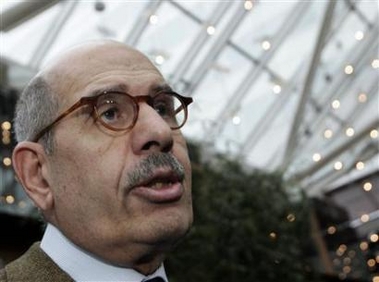Asia-Pacific
N. Korea nuclear disarmament complex: IAEA
(Reuters)
Updated: 2007-03-12 22:50
 |
Large Medium Small |
BEIJING - The head of the UN nuclear watchdog said on Monday that moving to inspect and close facilities behind North Korea's nuclear weapons program would be complex as the two sides seek to rebuild severed ties.
 International Atomic Energy Agency (IAEA) Director General Mohamed ElBaradei talks to the media during his arrival at a hotel in Beijing March 12, 2007. [Reuters]  |
That pact aims to wind down North Korea's nuclear weapons ambitions in exchange for aid and security assurances.
"It is going to be a very incremental process," he told reporters on arrival in Beijing. "There's a lot of confidence that needs to be built."
IAEA inspectors have not visited the isolated North since 2002, when Pyongyang expelled them as a previous disarmament deal ruptured. Days later, North Korea announced its "automatic and immediate" withdrawal from the Nuclear Non-Proliferation Treaty.
"We need a lot of bridges to build, confidence to re-establish," ElBaradei said.
A shutdown of North Korea's Yongbyon nuclear plant by mid-April is the centerpiece of last month's accord reached in six-party talks grouping the two Koreas, Japan, Russia, the United States and host China.
"I hope we can agree with the DPRK (North Korea) to get our inspectors back in time to implement the agreement of the six-party talks," he said.
But he was not certain the IAEA and Pyongyang could agree on how to proceed in time to meet the 60-day deadline for the shutdown.
MOVE FORWARD
"I'd like this trip at least to establish the framework and then gradually move forward," he said of North Korea's denuclearization. "It is in their interests obviously to keep to that deadline, but we'll see."
South Korea's chief envoy to the nuclear talks, Chun Yung-woo, on Monday gave North Korea good marks for living up to its initial obligations under the February 13 deal.
"I believe we should be able to implement the initial steps of denuclearization without any major obstacles if (the countries) continue to do their utmost, as they have been until now," Chun told reporters, Yonhap news agency reported.
Japan's top government spokesman said positive results from ElBaradei's trip were vital to convince the world that North Korea was sincere about scrapping its nuclear arms.
"It is indispensable (for North Korea) to secure confidence through the IAEA's activities, and we of course hope that their activities will produce a breakthrough," the spokesman, Yasuhisa Shiozaki, told reporters
ElBaradei also wanted to discuss North Korea's re-entry into the IAEA, which oversees global nuclear safeguards, including the Non-Proliferation Treaty.
"I hope we will be able to agree on modalities to normalize the relationship with the IAEA and hopefully for the DPRK to come back as a full member of the agency." The Democratic People's Republic of Korea, or DPRK, is the North's formal name.
North Korea announced in 2005 it had nuclear arms and in 2006 it test-detonated its first nuclear device, drawing U.N. financial and arms sanctions.
ElBaradei met China's chief envoy to the six-party talks, Vice Foreign Minister Wu Dawei, on Monday, and will leave for Pyongyang on Tuesday, likely returning to Beijing on Wednesday.
It was unclear who ElBaradei would meet in North Korea, but Melissa Fleming, an IAEA spokeswoman traveling with him said they anticipated meeting the senior North Korea envoy to the talks, Kim Kye-gwan. She said no trip to Yongbyon was planned.
| 分享按钮 |